- Home
- Sue Grafton
J is for JUDGMENT Page 5
J is for JUDGMENT Read online
Page 5
“Any idea where Jaffe went?”
“I talked to the desk clerk in my rudimentary Spanish, but it didn’t produce much except a half-concealed smirk. If you want my opinion, I think there’s a good chance he’s heading back in this direction.”
I could practically hear Mac squinting through the telephone lines. “I don’t believe it. You really think he’d step a foot in this state? He wouldn’t have the nerve. The man would have to be nuts.”
“I know it sounds risky, but his kid’s in trouble. Put yourself in his place. Wouldn’t you do the same?”
There was silence. Mac’s kids were grown, but I knew he was still protective. “How could he have known what was going on?”
“I don’t know, Mac. It’s always possible he kept in touch. We don’t have a clue where he’s been all these years. Maybe he still has contacts in the area. It’s probably worth pursuing if we’re trying to get a line on his current whereabouts.” Mac cut in. “What’s the game plan here? You have a scheme in the works?”
“Well, I think we should find out how soon the kid’s being brought back from Mexicali. I can’t believe much will happen over the weekend. Monday, I can talk with one of the deputies at the county jail. Maybe we can I pick up Wendell’s trail from there.”
“Sounds like a long shot.”
“The long shot was Dick Mills’s spotting him in the first place.”
“True enough,” he conceded, though he wasn’t happy about it.
“I’ve also been thinking we should talk to the local cops. They have the kind of resources I can’t touch.”
I could hear him hesitate. “Seems early to bring the police into it, but I’ll let you use your own judgment. I wouldn’t mind the help, but I’d hate to scare him off. If he shows, that is.”
“I’m going to have to get in touch with old friends of his. We’ll just have to run the risk of somebody warning him off.”
“You think his pals will cooperate?”
“I have no idea. I gather he ripped off a lot of folks back then. Surely there are some who’d like to see him land in jail.”
“You’d think so,” he said.
“Anyway, we’ll talk Monday morning, and in the meantime, don’t fret.”
Mac’s laugh was bleak. “Let’s hope Gordon Titus doesn’t get wind of this.”
“I thought you said you’d take care of him.”
“I was picturing an arrest. Lots of public glory for you.”
“Hold on to the thought. We may get there yet.”
I spent the next two days in bed, my vacation extending into a lazy, unproductive weekend by virtue of my affliction. I love the solitude of illness, the luxury of hot tea with honey, the canned tomato soup with gooey grilled-cheese sandwiches. I kept a box of Kleenex on my nightstand, and the wastebasket by the bed was soon filled to the rim with a puffy soufflé of used tissues. One of the few concrete memories I have of my mother was her salving my chest with Vicks VapoRub, then covering it with a square of pink rose-sprigged flannel, secured to my pajama top with safety pins. The heat of my body would envelop my nasal passages in a cloud of heady fumes while the ointment on my skin conveyed a mentholated contradiction of searing heat and biting cold.
I dozed fitfully during the day, my body aching with inactivity. For two hours each afternoon, I staggered down my spiral stairs, dragging my quilt behind me like a wedding train. I curled up on my sofa bed and flipped on the television set, watching mindless reruns of “Dobie Gillis” and “I Love Lucy.” At bedtime I stood in my bathroom at the sink and filled my little plastic cup with the vile, dark green syrup that would ensure a good night’s sleep. I’ve never once downed a hit of NyQuil without shuddering violently afterward. Nonetheless, I’m aware that I harbor all the incipient characteristics of an over-the-counter cold medication addict.
Monday morning I woke at 6:00 A.M. only moments before the alarm was set to go off. Once I opened my eyes, I lay in my rumpled nest and stared up at the domed Plexiglas skylight above my bed, trying to gauge the day ahead. The morning sky was thickly overcast, bright, white clouds forming a dense ceiling probably half a mile thick. At the airport, the commuter flights to San Francisco, San Jose, and Los Angeles would be stalled out on the runways, waiting for the fog to lift.
July in Santa Teresa is an unsettling affair. Morning dawns behind a cloud bank that lingers just off the coast. Sometimes the marine layer clears by afternoon. Other times the sky remains overcast and the day stretches on in a nebulous gloom, creating the illusion of storm clouds hovering. The local citizens complain and the Santa Teresa Dispatch reports the temperatures in a chiding tone as if the summer season weren’t al-ways this way. Tourists, who arrive in search of rumored California sunshine, spread their paraphernalia on the beach-umbrellas and sunscreen, portable radios and swim fins-waiting patiently for a break in the monotonous gray skies. I see their little children hunkered in the surf with toy buckets and shovels. Even from a distance I can sense their goose bumps and pale blue lips, teeth beginning to chatter as the icy water surges around their bare feet. This year the weather had been very strange, varying wildly from one day to the next.
I rolled out of bed, pulled on my sweats, brushed my teeth, and combed my hair, avoiding the sight of my sleep-smudged face. I was determined to run, but my body thought otherwise, and after half a mile I was beset by a coughing fit that sounded like the mating call of some wild beast. I abandoned the notion of a three-mile jog and contented myself with a brisk walk instead. My cold, by then, had settled in my chest, and my voice had dropped into that wonderful, husky PM disc jockey range. By the time I reached home, I was chilled but invigorated.
I took a steaming hot shower to loosen my bronchial passages and emerged from the bathroom feeling somewhat restored. I changed my sheets, emptied trash, ate a breakfast of fruit and yogurt, and went into the office with a file folder full of clippings. I found a parking space down the street, hoofed the block and a half, then hit the stairs. My usual pace is two stairs at a time, but today I had to pause at every landing on the way up. The downside of fitness, which takes years to achieve, is how quickly it vanishes-almost instantly. After three days of inactivity I was back to square one, huffing and puffing like a rank amateur. The shortness of breath inspired a renewed round of coughs. I entered through the side door and paused to blow my nose.
As I passed Ida Ruth’s desk, I stopped for a chat. When I first met Lonnie’s secretary, I found the double name unwieldy. I tried shortening it to Ida, but I found it didn’t suit. The woman is in her mid-thirties, a robust outdoor type who looks as if a day of typing would drive her round the bend. Her hair is white blond, combed away from her face as if blown by a strong wind. Her complexion is sun-scrubbed, her lashes white, her eyes an ocean blue. Her clothing is conservative: straight medium-length skirts, boxy jackets in muted tones, her blouses a boring succession of the long-sleeved, button-down sort, She looks like she‘d prefer to be paddling a kayak or climbing the face of a rock in some national park. I’ve heard that in her spare time she does precisely that-backpacking trips to the High Sierras, fifteen-mile day hikes in the local mountain range. She’s undeterred by ticks, steep inclines, venomous snakes, poison oak, sticks, sharp rocks, mosquitoes, or any of the other joyous aspects of nature I avoid at all costs.
She flashed a smile when she saw me. “You’re back. How was Mexico? You turned orange, I see.”
I was in the process of blowing my nose, my cheeks suffused with pink from the climb to the third floor. “Great. I had a ball, picked up a cold on the plane coming back. I’ve been in bed for two days. That’s my faux tan,” I said.
She opened her pencil drawer and took out a mint dish filled with big white pills. “Vitamin C. Take a handful. It’ll help.”
Dutifully I plucked up a pill, which I held to the light. It was easily an inch long and looked like it would require surgical removal if it got lodged going down.
“Go on. Help yourself. And try zinc if
your throat hurts. How was Viento Negro? Did you get up to see the ruins?”
I picked up another couple of vitamin C’s. “Pretty good. A little windy. What ruins?”
“You’re kidding. The ruins are famous. There was a huge volcano that blew…, oh, I don’t know… in 1902? It was something like that. In a matters of hours, the entire town was buried in a blanket of ash.”
“I saw the ash,” I said helpfully.
Her telephone rang and she took the call while I continued across the hall, pausing at the water cooler to fill a paper cup. I tossed down the vitamin C, adding an antihistamine for good measure. Better living through chemistry. I moved on to my office, unlocked the door, and opened one of the windows, letting in some fresh air after the week away. There was a pile of mail on my desk: a few checks for accounts receivable and the rest of it junk. I checked my answering machine for messages-there were six-and I spent the next thirty minutes getting life in order. I made up a file for Wendell Jaffe and tucked in the newspaper articles about his son’s escape and recapture.
At 9:00 I put a call through to the Santa Teresa Police Department. I asked for Sergeant Robb, belatedly aware that my heart had begun to thump. I hadn’t seen Jonah for a year by my calculation. I’m not sure our relationship could ever have been classified as an “affair.” At the time I first met him, he was separated from his wife, Camilla. She’d walked out on the marriage, taking both their daughters, leaving Jonah with a freezer full of home-cooked meals that she’d placed in recycled TV dinner trays. In roughly three hundred foil-wrapped tins, she’d assembled an entree and two vegetables. The directions taped to the top, always said the same thing: “Bake in 350 oven for 30 minutes. Remove foil and eat.” Like he was really going to try to eat with the foil in place. Jonah didn’t seem to think that was weird, which should have been a clue. In theory, he was a free man. In truth, she kept him on a tight rein. She’d come back at intervals, insisting that the two of them see a therapist. She’d find a new marriage counselor for each reconciliation, thus assuring that no real progress was ever made. If they came anywhere close to working out a relationship, she would split again. I finally decided that I had troubles enough, so I removed myself from the situation. Not that either of them seemed to notice. They’d been together since the seventh grade, when both were thirteen years old. One day I would read about them in the local paper, celebrating the wedding anniversary where etiquette suggests gifts made of recycled aluminum.
In the meantime, Jonah was still working the missing persons detail. He came on the line abruptly, using his businesslike policeman’s manner. “Lieutenant Robb,” he said.
“Oh, wow, it’s ‘Lieutenant’ Robb. You’ve been promoted. Congratulations. This is a voice from your past. It’s Kinsey Millhone,” I said.
I enjoyed the moment of startled silence while he computed my identity. I pictured him suddenly sitting back in his chair. “Well, hey there. How are you?”
“I’m fine. How are you?”
“Not bad. You have a cold? I didn’t recognize your voice. You sound all stuffed up.”
We went through the formalities, exchanging basic information, which didn’t take that long. I told him I’d left California Fidelity. He told me Camilla had come back to him. I could see it wasn’t any different from missing fifteen episodes of your favorite soap opera. Tuning in again, weeks later, you realize you really haven’t lost’ a beat.
Like a plot synopsis, Jonah began to fill me in. “Yeah, she got a job last month. Working as a court clerk. I think she’s happier. She has a little money of her own, and everybody seems to like her. She thinks it’s interesting, you know what I mean? Helps her understand my job, which is good for both of us.”
“Well, that’s great It sounds good,” I said. He must have noticed I didn’t press for additional details. I could feel the conversation stalling like a biplane about to I crash. It’s disconcerting to realize how little you have to say to someone who once occupied such a prominent I place in your bed. “You’re probably wondering why I got in touch,” I said.
Jonah laughed. “Yeah, I was. I mean, I’m glad to hear from you, but I figured there was something up.”
“Remember Wendell Jaffe? The guy who disappeared off his sailboat…”
“Oh! Yeah, yeah, yeah. Of course.”
“He’s been spotted in Mexico. It’s possible he’s on his way back to California.”
“You’re kidding.”
“No, I’m not” I told him an abbreviated version of my encounter with Wendell, omitting the fact that I’d broken into his room. In talking to cops, I don’t always volunteer information. I can be a dutiful citizen when it suits my purposes, but this wasn’t one of those occasions. For starters, I was secretly embarrassed that I’d blown the contact if I’d done the job right, Wendell never would have known anyone was on his tail. I said, “Who should I be talking to? I thought I ought to notify someone, preferably the detective in charge of the case back then.”
“That’d be Lieutenant Brown, but he’s gone now. He retired last year. You’ll probably want to talk to Lieutenant Whiteside in Major Frauds. I can have you transferred if you like. That Jaffe was a bad-ass. Neighbor of mine lost ten grand because of him, and that was pea nuts compared to most.”
“I gathered as much. Did they have any recourse?”
“They put his partner in jail. Once the scam came to light, all the investors brought suit. Since there wasn’t any way to get Jaffe served, they ended up publishing the summons and complaint, and finally took his default. Of course, they got the judgment, but there wasn’t any way to collect from him. He stripped all his bank accounts before he disappeared.”
“So I heard. What a bummer.”
“You got that right. Plus, he was mortgaged to the eyeballs, so his house wasn’t worth a cent. I know people who’d love to think he’s still around someplace. He ever showed up, they’d enforce the judgment in ten seconds flat, whip his ass into court, and take everything he had. Then he’d be arrested. What makes you think he’d be dumb enough to come back?”
“He’s got a kid in big trouble, according to the papers. You know those four inmates who escaped from Connaught? One of them was Brian Jaffe.”
“Shit, that’s right. I didn’t make the connection, I knew Dana in high school.”
“That’s his wife?” I asked.
“That’s right. Her maiden name was Annenberg. She got married right after graduation.”
“Can you get me an address?”
“Shouldn’t be too hard. She’s probably in the book. Last I heard she was down around PIO some place.”
PIO was the ready reference locally to the two adjoining towns – Perdido and Olvidado – on Highway 101 thirty miles to the south. The towns looked just the same, except that one favored shrubs along the highway and the other did not. Usually the two were referred to in the same breath – P/O with a hash mark mentally inserted between the initials. I was making notes like crazy on a legal pad.
Jonah’s tone underwent a shift. “I’ve missed you.”
I ignored that, conjuring up a piece of fiction to extricate myself before the conversation turned personal. “Oops. I better go. I have a client due in ten minutes, and I want to talk to Lieutenant Whiteside first. Can you have me switched over to his extension?”
“Sure thing,” he said. I heard him depress the plunger rapidly several times in succession.
When the operator picked up, he had the call transferred to the detective bureau. Lieutenant Whiteside was away from his desk but was expected back shortly. I left my name and number with a request to have him get back to me.
Chapter 6
*
At noon, feeling punk, I walked up to the corner minimarket, where I bought a tuna salad sandwich, a bag of potato chips, and a diet Pepsi. I figured this was no time to obsess about being nutritionally correct. I went back to my office and ate sitting at my desk. For dessert I sucked on some cherry cough drops.
Lieutenant Whiteside finally called me at 2:35 with apologies for the delay. “Lieutenant Robb tells me you may have a line on our old friend Wendell Jaffe. What’s the story?”
For the second time that day, I went through an abbreviated version of my encounter. From the nature of the silence on his end, I had to guess Lieutenant Whiteside was taking notes.
He said, “You have any idea if he’s using an alias?”
“If you don’t press for details, I’ll confess I did get a wee tiny glimpse at his passport, which was issued in the name Dean DeWitt Huff. He’s traveling in the company of a woman named Renata Huff, who must be his common-law wife.”
“Why common-law?”
“He’s not divorced, as far as I’ve heard. His first wife !tad him declared dead a couple of months ago. Oh, wait a minute now, can dead men remarry? I hadn’t thought about that. It’s possible he isn’t really a bigamist. Anyway, according to the data I saw, the passports came out of Los Angeles. He may well be in the country by now. Is there any way to track the names through the passport office down there?”
Lieutenant Whiteside eased in. “Not a bad idea. Spell the last name for me, if you would. Is it H-o-u-g-h?”
“H-u-f-f.”
“I’m making myself a memo,” he said. “What I’ll do is check with Los Angeles and see what passport records show. We can also notify customs officials at LAX and San Diego so they can keep an eye out in case he comes through either port of entry. I can also notify San Francisco just to cover that base.”
“You want the passport numbers?”
“Might as well, though my guess is the passports are forged or counterfeit. If he skipped – which is what it looks like – Jaffe may have ID in half a dozen names. He’s been gone a long time, and he may have set up more than one set of documents in the event things get tight. That’s what I’d do if I was him.”
“Makes sense,” I said. “I keep thinking if Wendell contacted anyone, it’d be his old partner, Carl Eckert.”

 S Is for Silence
S Is for Silence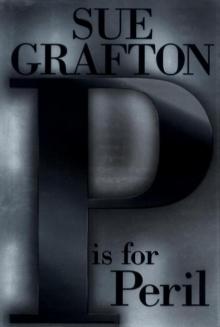 P Is for Peril
P Is for Peril R Is for Ricochet
R Is for Ricochet J Is for Judgment
J Is for Judgment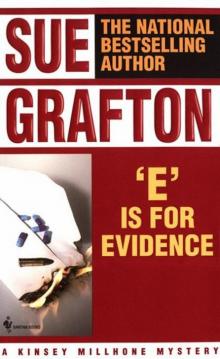 E Is for Evidence
E Is for Evidence T Is for Trespass
T Is for Trespass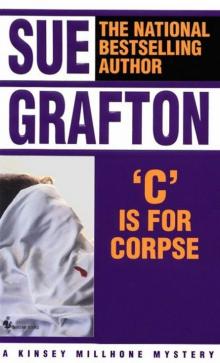 C Is for Corpse
C Is for Corpse U Is for Undertow
U Is for Undertow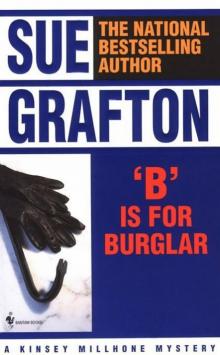 B Is for Burglar
B Is for Burglar Four Sue Grafton Novels
Four Sue Grafton Novels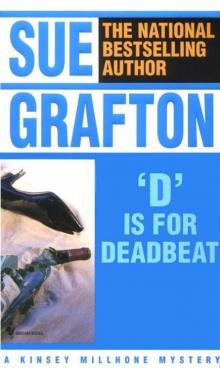 D Is for Deadbeat
D Is for Deadbeat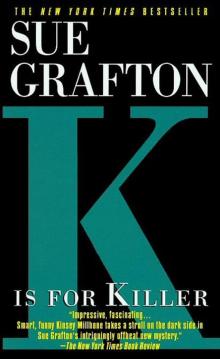 K Is for Killer
K Is for Killer I Is for Innocent
I Is for Innocent A Is for Alibi
A Is for Alibi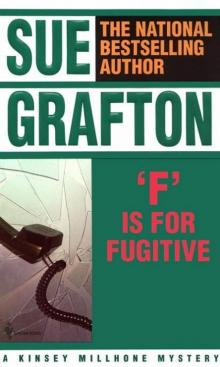 F Is for Fugitive
F Is for Fugitive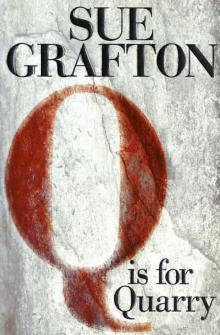 Q Is for Quarry
Q Is for Quarry W Is for Wasted
W Is for Wasted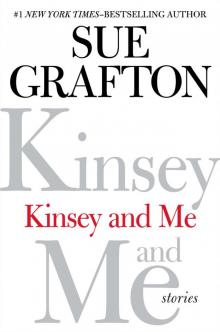 Kinsey and Me: Stories
Kinsey and Me: Stories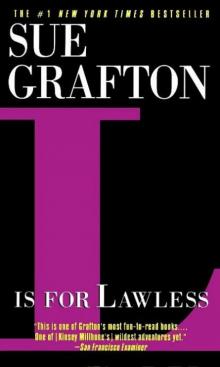 L Is for Lawless
L Is for Lawless Y Is for Yesterday
Y Is for Yesterday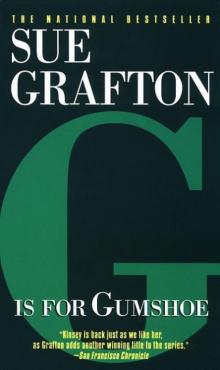 G Is for Gumshoe
G Is for Gumshoe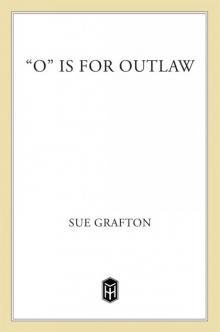 O Is for Outlaw
O Is for Outlaw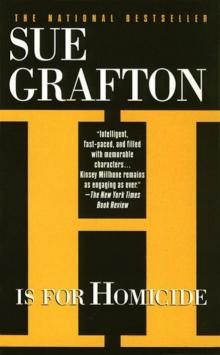 H Is for Homicide
H Is for Homicide X
X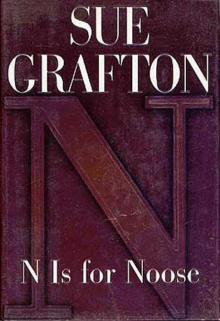 N Is for Noose
N Is for Noose Three Complete Novels: A Is for Alibi / B Is for Burglar / C Is for Corpse
Three Complete Novels: A Is for Alibi / B Is for Burglar / C Is for Corpse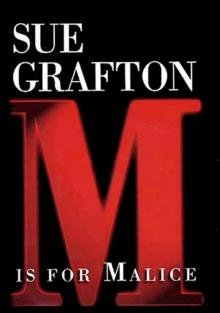 M Is for Malice
M Is for Malice I is for INNOCENT
I is for INNOCENT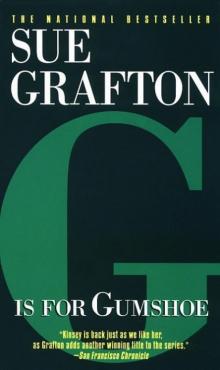 G is for GUMSHOE
G is for GUMSHOE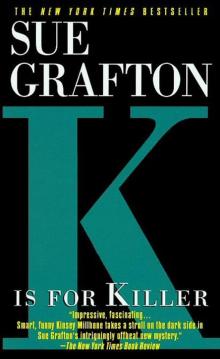 K is for KILLER
K is for KILLER S is for SILENCE
S is for SILENCE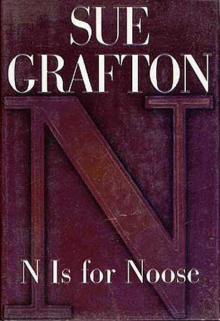 N is for NOOSE
N is for NOOSE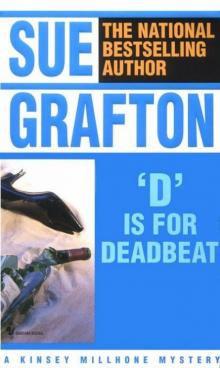 D is for DEADBEAT
D is for DEADBEAT V is for Vengeance
V is for Vengeance U is for Undertow
U is for Undertow W Is for Wasted km-23
W Is for Wasted km-23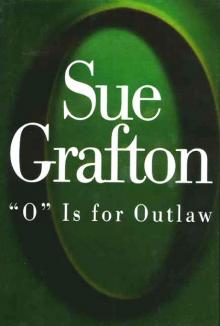 O is for OUTLAW
O is for OUTLAW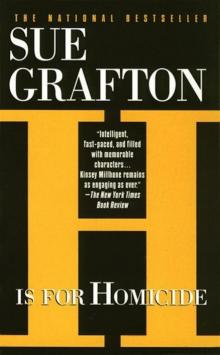 H is for HOMICIDE
H is for HOMICIDE Sue Grafton Novel Collection
Sue Grafton Novel Collection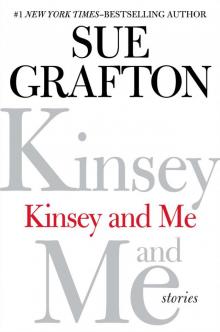 Kinsey and Me
Kinsey and Me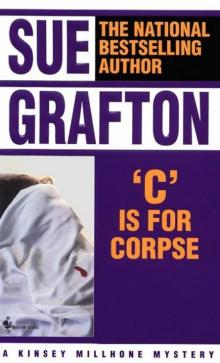 C is for CORPSE
C is for CORPSE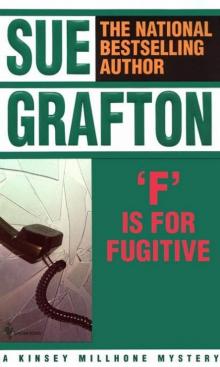 F is for FUGITIVE
F is for FUGITIVE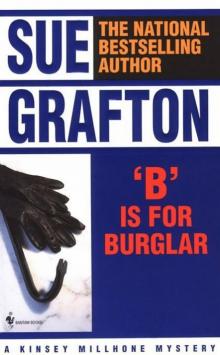 B is for BURGLAR
B is for BURGLAR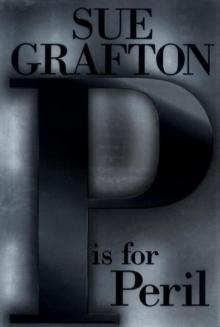 P is for PERIL
P is for PERIL A is for ALIBI
A is for ALIBI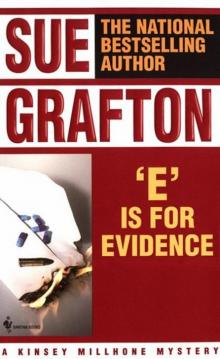 E is for EVIDENCE
E is for EVIDENCE J is for JUDGMENT
J is for JUDGMENT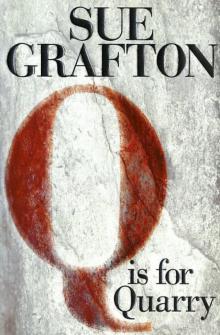 Q is for QUARRY
Q is for QUARRY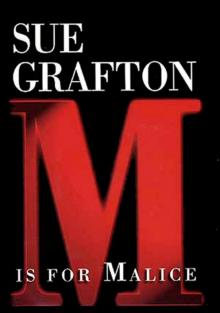 M is for MALICE
M is for MALICE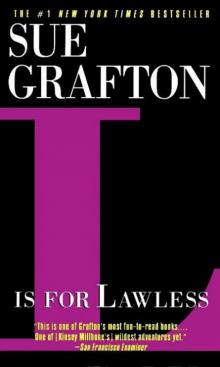 L is for LAWLESS
L is for LAWLESS